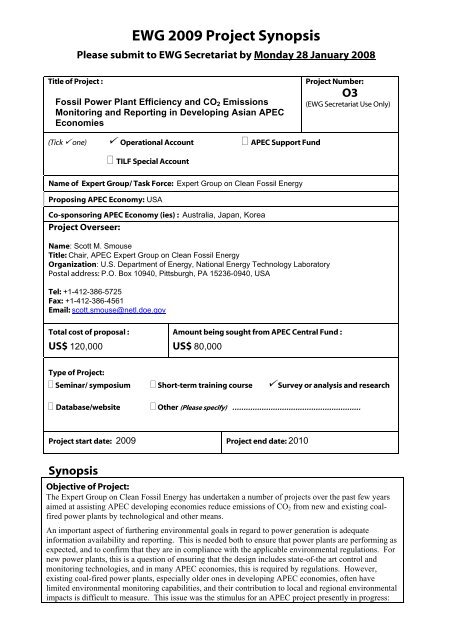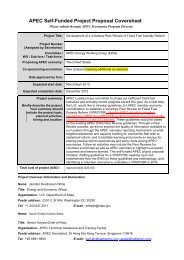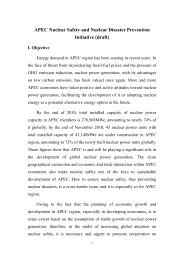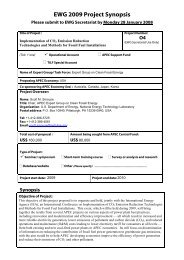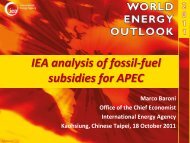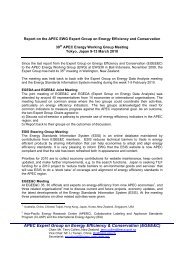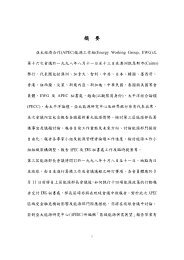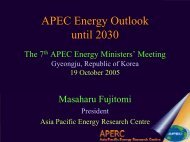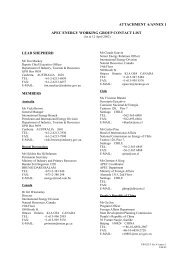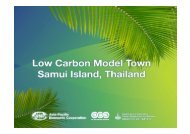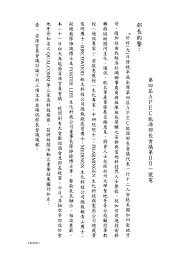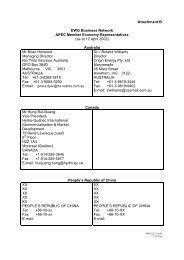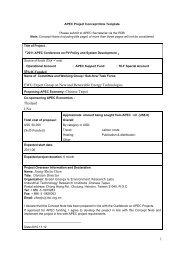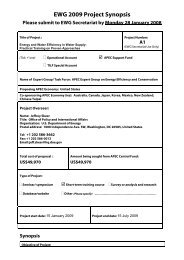EWG 2009 Project Synopsis
EWG 2009 Project Synopsis
EWG 2009 Project Synopsis
You also want an ePaper? Increase the reach of your titles
YUMPU automatically turns print PDFs into web optimized ePapers that Google loves.
<strong>EWG</strong> <strong>2009</strong> <strong>Project</strong> <strong>Synopsis</strong><br />
Please submit to <strong>EWG</strong> Secretariat by Monday 28 January 2008<br />
Title of <strong>Project</strong> :<br />
Fossil Power Plant Efficiency and CO 2 Emissions<br />
Monitoring and Reporting in Developing Asian APEC<br />
Economies<br />
<strong>Project</strong> Number:<br />
O3<br />
(<strong>EWG</strong> Secretariat Use Only)<br />
(Tick one) Operational Account APEC Support Fund<br />
TILF Special Account<br />
Name of Expert Group/ Task Force: Expert Group on Clean Fossil Energy<br />
Proposing APEC Economy: USA<br />
Co-sponsoring APEC Economy (ies) : Australia, Japan, Korea<br />
<strong>Project</strong> Overseer:<br />
Name: Scott M. Smouse<br />
Title: Chair, APEC Expert Group on Clean Fossil Energy<br />
Organization: U.S. Department of Energy, National Energy Technology Laboratory<br />
Postal address: P.O. Box 10940, Pittsburgh, PA 15236-0940, USA<br />
Tel: +1-412-386-5725<br />
Fax: +1-412-386-4561<br />
Email: scott.smouse@netl.doe.gov<br />
Total cost of proposal :<br />
US$ 120,000<br />
Amount being sought from APEC Central Fund :<br />
US$ 80,000<br />
Type of <strong>Project</strong>:<br />
Seminar/ symposium Short-term training course Survey or analysis and research<br />
Database/website<br />
Other (Please specify) …………………………………………………<br />
<strong>Project</strong> start date: <strong>2009</strong> <strong>Project</strong> end date: 2010<br />
<strong>Synopsis</strong><br />
Objective of <strong>Project</strong>:<br />
The Expert Group on Clean Fossil Energy has undertaken a number of projects over the past few years<br />
aimed at assisting APEC developing economies reduce emissions of CO 2 from new and existing coalfired<br />
power plants by technological and other means.<br />
An important aspect of furthering environmental goals in regard to power generation is adequate<br />
information availability and reporting. This is needed both to ensure that power plants are performing as<br />
expected, and to confirm that they are in compliance with the applicable environmental regulations. For<br />
new power plants, this is a question of ensuring that the design includes state-of-the art control and<br />
monitoring technologies, and in many APEC economies, this is required by regulations. However,<br />
existing coal-fired power plants, especially older ones in developing APEC economies, often have<br />
limited environmental monitoring capabilities, and their contribution to local and regional environmental<br />
impacts is difficult to measure. This issue was the stimulus for an APEC project presently in progress:
“Environmental Monitoring for Coal-Fired Power Plants in Developing Asian APEC Economies”.<br />
As concern about greenhouse gas emissions grows, it becomes increasingly evident that more accurate<br />
information on emissions of CO 2 from fossil fuel power plants will be needed. Since the determining<br />
factors for this are coal characteristics and power plant efficiency, a good global database of actual, as<br />
distinct from theoretical, efficiencies of operating plants needs to be assembled on an international basis.<br />
The International Energy Agency (IEA) has been carrying out a number of activities related to cleaner<br />
fossil fuels, in response to a request by the G8 Gleneagles Summit in 2005, which invited the IEA to<br />
review, assess and disseminate widely information on energy efficiency of coal-fired power plants; and<br />
to recommend options to make best practice more accessible. The IEA response includes a coal-fired<br />
power database, assessment of upgrading and replacement of older coal-fired plants in major coal using<br />
economies and country-based coal-fired power sector reviews, new developments and case studies of<br />
equipment and plant upgrades in different regions aiming at efficiency improvement.<br />
Power plant efficiency data are more readily available for developed economies, but accurate information<br />
for plants in developing economies is not systematically obtained. The APEC region contains<br />
developing economies that are rapidly expanding their electricity generation sector based on fossil fuels,<br />
especially coal, so it would be appropriate for APEC to complement the IEA effort with a project to<br />
improve the availability of power plant efficiency information specifically targeted on these economies.<br />
The objectives of this project are to:<br />
• gather, synthesize, and assess experience in developing APEC economies with regard to fossil<br />
power plant efficiency monitoring and reporting by individual (both existing and new) fossil<br />
fuel-fired power generating plants;<br />
• promote regulatory requirements for information gathering on fossil power plant efficiencies in<br />
APEC economies where such requirements do not already exist; and<br />
• coordinate development of an APEC database on fossil power plant efficiencies with that of<br />
other international organizations, particularly the International Energy Agency.<br />
Methodology:<br />
The project will be initiated with a joint APEC/IEA workshop held in a developing APEC economy, and<br />
will be carried out with the assistance of a qualified consultant, who would have the task of defining the<br />
information needs in detail, assisting in organizing the workshop, analyzing the information available,<br />
and writing a final report with recommendations for action. The emphasis of the project will be on coalfired<br />
power plants, though consideration will be given to other fossil fuel plants. The consultant will<br />
work closely with a steering team of EGCFE members and IEA representatives.<br />
The workshop will bring together government and power industry representatives from APEC<br />
economies, to define, identify, and exchange information relevant to the objectives of the project.<br />
Among topics that the workshop will cover are:<br />
• Availability of statistical information about coal quality on an individual plant basis.<br />
• Availability of information on actual generating efficiencies of individual plants on an annual<br />
basis.<br />
• Factors affecting calculation of annual CO emissions from individual plants.<br />
2<br />
• Current relevant reporting requirements in force in individual APEC economies, for new and<br />
existing fossil power plants<br />
• Recommendations for improving the availability of information on individual fossil power plant<br />
generating efficiency and CO emissions in APEC economies.<br />
2<br />
• Integration of an APEC database on fossil power plant efficiencies with that of other<br />
international organizations.<br />
How does the project proposal align with <strong>EWG</strong> and APEC-wide priorities:<br />
This project will strengthen regional energy security by preserving the coal option while creating<br />
essential conditions for improving environmental protection in the power generation sector.<br />
The Declaration by APEC Energy Ministers meeting in Darwin in 2007 stated that improving energy<br />
efficiency is a cost-effective way to enhance energy security and mitigate greenhouse gas emissions.<br />
Ministers encouraged the development of cleaner and more efficient power generation technologies.<br />
APEC Economic Leaders, meeting in Sydney in September 2007, addressed the challenges of climate
change, energy security and clean development, outlining their resolve on this issue in their Declaration<br />
on Climate Change, Energy Security and Clean Development, which included the following statements:<br />
• We, the APEC Economic Leaders, agree that economic growth, energy security and climate<br />
change are fundamental and interlinked challenges for the APEC region.<br />
• Our success has relied in part on secure supplies of energy, the use of which has also contributed<br />
to air quality problems and greenhouse gas emissions.<br />
• We are committed, through wide-ranging and ambitious actions, to ensuring the energy needs of<br />
the economies of the region while addressing the issue of environmental quality and contributing<br />
to the reduction of greenhouse gas emissions.<br />
• Fossil fuels will continue to play a major role in our regional and global energy needs, Cooperation,<br />
including joint research, development, deployment and transfer of low and zero<br />
emission technologies for their cleaner use, particularly coal, will be essential.<br />
• Improving energy efficiency is a cost-effective way to enhance energy security and address<br />
greenhouse gas emissions while promoting economic growth and development.<br />
This project responds to the energy efficiency goals of APEC Energy Ministers, in that its overall<br />
objective is to contribute to mitigation of greenhouse gas emissions by improving the availability of<br />
information on the actual generating efficiencies and amounts of CO 2 emitted annually by existing fossil<br />
fuel power plants in APEC economies.<br />
The primary objective of the project is to contribute to mitigation of global climate change due to CO 2<br />
emissions by means of improving the information available on emissions from fossil power plants in the<br />
APEC region. Global climate change is expected to impact agricultural production and the availability of<br />
water, and to cause sea levels to rise. These and other negative impacts of climate change more<br />
significantly impact the poor and disadvantaged, including often women. These sectors of human society<br />
are less able to afford to adapt to their changing surroundings.<br />
To ensure that the women’s perspectives are adequately represented, active participation of and input by<br />
women into the project will be sought through the members of the EGCFE steering committee.<br />
Cooperation in this endeavour by representatives of the IEA will also be sought. The project itself will be<br />
carried out by a consultant in response to a tender. In its evaluation of submitted bids, specific attention<br />
will be given to qualified women proposed by the bidder to work on the project. The EGCFE members<br />
involved will ensure that the winning submission adheres to the priorities of the Framework for the<br />
Integration of Women in APEC (“Accelerate the progress of integrating women in the mainstream of<br />
APEC processes and activities” and “Promote and encourage the involvement of women in all APEC<br />
fora”). The APEC Framework, as well as the Gender Analysis Guide and other relevant documents, will<br />
be made available to those involved in the project; their application will be monitored throughout the<br />
project.
INCORPORATING SUSTAINABLE DEVELOPMENT PRINCIPLES<br />
INTO <strong>EWG</strong> PROJECTS<br />
Process for incorporating sustainable development principles:<br />
1. <strong>Project</strong> Overseer complete self-assessment rating for each project proposal<br />
2. For APEC-funded projects, <strong>Project</strong> Overseer incorporates the principles into the project tender, tender<br />
assessment, and project implementation phases<br />
3. On completion of a project, the <strong>Project</strong> Overseer describes how the principles were addressed and<br />
their impact at the project evaluation phase (through a separate report).<br />
Sustainable Development<br />
Principle<br />
Strengthening regional energy<br />
security<br />
Supporting energy market<br />
reform and energy<br />
infrastructure development<br />
Promoting uptake of clean and<br />
efficient energy and efficient<br />
use of energy<br />
Building capacity and technical<br />
cooperation within APEC<br />
economies<br />
Building public-private<br />
partnerships and strengthening<br />
stakeholder engagement,<br />
1<br />
including with the APEC<br />
business community<br />
TOTAL SCORE 5<br />
SELF-ASSESSMENT RATING<br />
<strong>Project</strong><br />
Supporting Information<br />
Link (1<br />
point for<br />
each)<br />
1<br />
1<br />
1<br />
1<br />
By helping to improve the availability of information<br />
on generating efficiencies of individual coal-fired<br />
power plants, and promoting effective reporting<br />
requirements for generating efficiencies of new and<br />
existing plants, this project will strengthen regional<br />
energy security by preserving the coal option while<br />
addressing the climate change issue.<br />
The project will develop information that provides<br />
incentives for improving the efficiency of new and<br />
existing power generation infrastructure.<br />
This project will promote the uptake of cleaner and<br />
more efficient coal power generation technologies, as<br />
well as improvement of the efficient use of energy in<br />
existing power plants.<br />
This project will help member economies build<br />
capacity in power plant operational performance, and<br />
provide opportunities for technical cooperation on<br />
best practices in this area.<br />
The project will strengthen public-private sector<br />
dialog and encourage technologies and methods for<br />
more efficient power generation, with private sector<br />
involvement in APEC economies.


